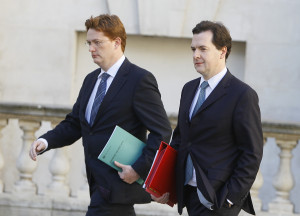The Government followed-up its spending review this week with the announcement of plans for a £100bn modernisation of the UK’s infrastructure, including new homes, road repairs and improved flood protection. The package also seeks to promote new sources of energy, such as shale gas.
Treasury Minister and Liberal Democrat MP Danny Alexander, who outlined the plans to Parliament on Thursday, claimed the project would put “long-term priorities before short-term political pressures”.
But opposition parties were not without criticism. Labour said the projects must immediately as capital investment in the economy was actually falling, while the Greens decried the plans for their likely environmental danger.
The key projects are:
£3bn to build 165,000 new affordable homes.
£28bn for road improvements, including £10bn for essential maintenance.
£10bn to clear a “backlog” of school building repairs.
850 miles of railway to be electrified as part of £30bn rail investment.
£250m for extended super-fast broadband to rural areas.
£370m for flood defences. Agreement with industry to provide affordable insurance for flood-hit homes.
£800m extra funding for Green Investment Bank.
£150m for health research including into dementia.
£100m for a new prison in Wales.
The spending is set to be stretched out over the next seven years: while the first £50bn is committed to infrastructure projects starting in 2015-16, the rest is for the period from 2016 to 2020.
“This is an ambitious plan to build an infrastructure that Britain can be proud of,” Alexander told the House of Commons. He described the road building plan as the largest for forty years, and the support for affordable new housing as the biggest in two decades.
Nuclear power will also be supported under the new programme, with new support to help the building of plants, including a third at Hinkley Point in Somerset. There will also be a guaranteed price for offshore wind energy and tax incentives brought in for shale gas projects.
Alexander’s comments came just as a new report was being published showing that the UK’s shale gas reserves are much greater than previously estimated.
The transport plans focused mainly on roads and railways. Alexander said £10bn would be spent on revamping the UK’s “decaying” road network, with 21,000 miles of roads to be resurfaced and new lanes to be added to the busiest stretches of motorways.
Alexander said the spending on roads was equivalent to the cost of filling 19m potholes.
On rail, he restated plans to electrify large parts of the network and increased the budget to more than £42bn. for the proposed High Speed 2 line connecting London with seven of the largest UK cities.
Chancellor George Osborne earlier explained to the BBC that the coalition had a “long-term plan” rather than the “stop-start” approach of previous governments.
“You cannot just build a road in a week,” he said.
On energy, he said “environmentally safe” shale gas could provide “cheap energy” for many years to come, although he admitted that such projects would need to get the appropriate planning approvals. Such projects have met with much resistance from environmental campaigners.
Green Party MP Caroline Lucas said the government had got its priorities wrong, with spending being directed towards “polluting high-carbon infrastructure” of jobs in renewable energy and energy efficiency.
Sir Andrew Motion, president of the Campaign to Protect Rural England, has similarly decried the plans as a “needless smearing of concrete across our irreplaceable countryside in a misguided attempt to kick-start the economy.”
Meanwhile Shadow Chancellor Ed Balls, speaking to ITV’s Daybreak, attacked the government’s inertia, saying that most of the projects would not begin for years.
“They should do an immediate boost for housing and transport this year and next,” he said. “The international monetary fund says a £10bn boost is needed now… George Osborne talks about capital spending but he’s not actually acting.
“I don’t think the public buy into this at all – I think people see their living standards falling, tax cuts for millionaires, the economy flatlining, unemployment high. The plan has completely failed.”
The £50bn for 2015-16 actually represents a real-terms fall of 1.7% from the infrastructure budget for 2014-15. However, the coalition says the figure is still higher than the one Labour was planning in 2010.










